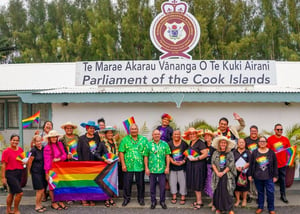Public Interest Journalism funded through NZ On Air
The FIFA women’s world cup kicks off in July next year co-hosted by Australia and New Zealand. This is the biggest women’s sporting event in the world and John Pulu met the Sāmoan lady in charge of it all.
Many schools like to boast about their former students, at Massey high school one of their alumna is Sarai Bareman. She is FIFA’s chief of women’s football now based in Switzerland. John Pulu took her back to where she fell in love with football, at Massey high school.
“It’s been a long time, yeah as a student. I don’t want to reveal too much but it was more than 20 years ago now so yeah it’s incredible to be back here,” Bareman says.
The pavement she once walked on as a student, now has greater significance as she now has her own plaque.
“I don’t think I would have ever dreamed when I was a student here at Massey high school that I would one day be standing here as an adult looking at a plaque with my achievements so it’s a really big honour. It’s kind of emotional it all started here right.”
The proud Sāmoan and Dutch New Zealander is FIFA’S first appointed Chief Women’s Football Officer in charge of women’s football all around the world.
“Our job is to support every one of those 211 countries with helping to grow women’s football and football in general in their countries.”
It was in West Auckland school where it all started for Sarai and it came after she switched from rugby to football.
“It’s so often is when you are a teenager you know you are in high school, you are led by what your friends’ group does and that’s one of the amazing things about football you know, it brings people together,” she says.
Her former football coach, Nick Hackett, is still there and he remembers a young determined athlete.
“She was very competitive and very fit and really got stuck in and, you know, kept the team together and we won in one of those seasons; we won our competition so it was great to see,” Hackett says.
Sarai continued playing club football in Auckland before moving to Sāmoa where she played for the national women’s team.
Then she began working for the Sāmoa Football Federation and before long she was running the organisation.
“It was very unusual to see a woman in a decision-making role so when I came into this role in Sāmoa as the CEO I was an outsider you know.
“And on top of being a woman in a male-dominated sport, I had to prove myself. Some of the challenges that I dealt with, you know, comments and being told my place is in the kitchen; you know, my opinions weren’t respected.
“For the first time I experienced the discrimination for being a woman and that was tough.”
That was a game-changer for Sarai who has gone on to tackle stereotypes and promote an ‘equal’ playing field on a global scale.
“We are in a moment now where women’s football is really on this huge growth trajectory. My job is working with our 211 countries we’ve got more than the United Nations and making sure each one of those countries has a strategy in place they are funding it, they are resourcing it, they have pathways and we provide them support,”
And it’s support that’s empowering female footballers from the grassroots to the professional level.
Ironically, her ultimate goal is to be out of a job.
“I want to be at a point in our sport where you don’t need a Chief Women’s Football Officer and a dedicated division to grow the sport because, it’s just football. It’s not men’s football, it’s not women’s football it’s just football and ultimately that’s where we should be.”










